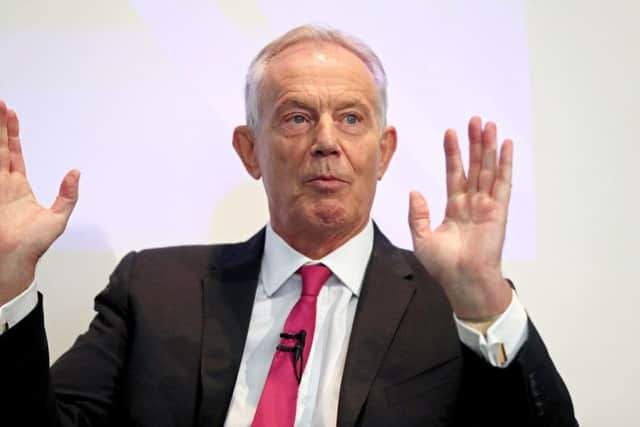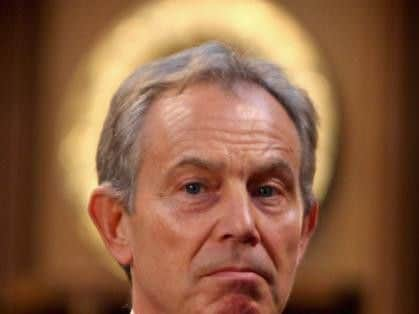Brexit: Tony Blair warns no-deal EU exit a 'profound threat' to UK future
Mr Blair said that politics in the UK had been "upended" through a combination of Brexit, ten years of austerity, and the election of Jeremy Corbyn as Labour leader.As a result, he said, Brexit would be used "persuasively" by supporters of independence to undermine the UK.
Speaking in Edinburgh to mark 20 years of the Scottish Parliament, he said devolution was "one of the biggest things" his government had achieved.
Advertisement
Hide AdAdvertisement
Hide Ad"It was a success because it was a policy we believed in, and we delivered it," he said. "The fact that no-one disputes it now is a tribute to its acceptance, controversial as it was at the time. Has it laid to rest the claims to go further for full independence? Obviously not, but Scotland remains in the UK as of now."


But he warned that Brexit was a threat to the future of the UK.
"Right now the most likely outcome is a no-deal Brexit. I believe that would be a profound threat to the UK.
"I remain a committed unionist. I want Scotland to remain part of the UK irrespective of Brexit, whether it does or doesn't happen, but it would be foolish to deny that if what is proposed is a no-deal Brexit it would be a whole additional dimension to the argument for independence for those who wish independence, who would use it and use it persuasively.


"That's why I continue to think that no Brexit is a better solution than no-deal Brexit."
He said that he believed it was still possible to stop Brexit in its tracks, "but I have one major plea that I make of MPs - to think about the choices they're going to make over the next few weeks. If there is a deadlock - and let's be clear there's no majority for a no-deal Brexit and it would be voted down by a large number of MPs - the right thing indeed is to go back to the people, but I beg and plead not by way of a General Election.
"To fix a General Election now, on the specific issue of Brexit, is wrong in principle and wrong on the politics."
While he said the strategy of the Conservative Party was to have a Brexit General Election, he described it as a "vast elephant trap of great width and depth, with great neon signs flashing around it saying elephant trap, elephants of limited awareness please fall in" and warned opposition parties to avoid it.
Advertisement
Hide AdAdvertisement
Hide Ad"Brexit, as we speak, is one of the things that's upended politics, but it could still go either way, no deal or no Brexit, and we should have referendum on it."
Mr Blair, who was born in Edinburgh and attended the private Fettes College, said his Scottish roots meant more to him "than is sometimes thought."
He added: "I was born here, but more important than birth, which is an accident of circumstance and chance, my parents grew up in Glasgow, and coming back to Edinburgh I realise how much of my childhood was spent here and how many memories there are and how deep the roots go.
He also reflected on his time as leader of the Labour Party, and at times his rocky relationship with Scottish Labour, but recalled it was the Scottish party which was the "first to vote for the new Clause 4 by the way, in case anyone has forgotten."
He said that while the Labour Party had "moved further to the left than ever before in its history" it was still the "only serious contender for government". However, he believed that the extreme natures of Labour's policies and Brexit, would push people to demand politics "more rooted in the rational centre." and "for a politics that's less divided than the politics we have presently, for a politics that reaches for a policies to unify.
"My belief is that it will be clear over these next months that there is potential for renewal for centre ground politics, I think that's true for the UK as a whole and for Scotland as well."
And he urged the Scottish Labour Party to use the departure of former Scottish Tory leader Ruth Davidson from front-line politics, as a way of capturing the centre ground.
"There's a very open space for the competition for that centre ground vote," he said. "Without wanting to offend any colleagues here from the Labour Party - I think I did enough of that when I was leader - I think there's a huge opportunity for Scottish Labour if it is a Labour party that celebrates the union, recognises that for the UK to stay in Europe is a natural part of sensible alliance building in today's world, and reaches forward for a modern policy agenda that understands that modern world and has policies that are able to meet those challenges."
Advertisement
Hide AdAdvertisement
Hide AdExpanding on the impact of Brexit he said it had had a "distractive effect" which had resulted in government failures to tackle the economic and cultural challenges being produced by rapid technological change.
"It is possible to pull our politics back to a place, where we're able to put aside the distraction of Brexit, where we're able to conduct no doubt what will be a continuing debate of independence but can recognise that independence won't solve these major challenges, and we're able instead to present the country with a choice that is a place of reason, of rational debate, a place where people can disagree without hating each other, then we will be much more capable of facing this huge challenge that we and every other developed nation will face, but which at this present time we're disabled from seeing, let alone tackling.
"It's a crucial point in time, and no doubt the debate about devolution right or wrong will continue to rage.
"I still think it's best that Scotland stays in that place, I still think the same argument applies to Britain's place in Europe. I hope that maybe out of all the turmoil of the past years, we're able to get to a place where our politics better reflects that view.
"I think if it does we may find that this populist surge which has distorted our politics finally exhausts itself and allows us to get back to true principles and true activity of governing in the interests of the people."
